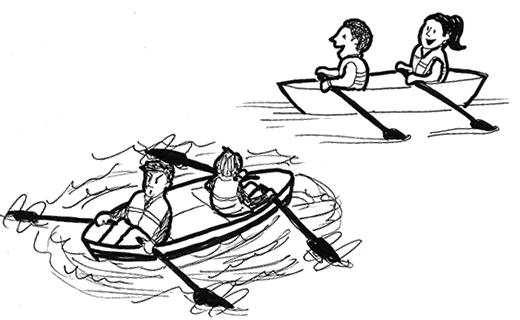There is more division in the world than ever before. The information age is partly to blame – its increasing technology-driven polarisation is driving a wedge between communities. We live in an era of radical ‘us and them’.
Key institutions dominate control of the information we consume – and the trouble is, there is no incentive for them to stop this separation.
Why would social media giants promote unity, when division is what drives attention-based revenue like advertising? Likewise, for traditional print media – it’s the negative headlines that drive the readership.
And politics is much the same. The opposition continually says how bad things are, in a bid to be elected themselves, next time. There is, again, no incentive to create an environment of collaboration and unity.
Our sense of good or bad in the world has been completely hijacked and manipulated. We have become accustomed to a climate of demonising and dehumanising ‘the other side’. Within any system, very little energy is spent on sewing the seams of community back together after the impact of this information onslaught and the ripping apart of society.
Whether in local politics, national politics or even geopolitics, the visceral nature of public discourse is getting out of hand. There has been a resurgence of hate crime at one end of the spectrum, and global tensions at the other.
One of the core pillars of The Dandelion Foundation’s work is to develop the bridging narratives that cross community divides. The focus is not to reinforce people’s existing views of the world, but to help them understand the reasons behind the opposing view.
The process is really subtle. Often, it means just having a coffee with the right person and helping them to become more compassionate towards ‘the opposition’. In in any polarised situation, a ‘third way’ opens up when both sides foster a deeper understanding of the complexities of a situation. ‘Black and white’ views are enriched and informed by recognising the subtle shades of grey between them.
Deep down, we all share a common humanity. Everyone is far more similar than we realise. And yet, we very rarely spend time establishing what it is that makes us similar.
It is well worth spending time with leaders from all backgrounds and persuasions, helping them to develop a better understanding of ‘others’ and discovering more collaborative and inclusive ways of doing things. This really works, and is worth the investment of time and resources.
When leaders (or ‘sides’) start to understand each other, they can create the narratives that bridge the divide and bring communities back together. Progress isn’t about being on the right side of the argument. Progress is a byproduct of community cohesion.
Over the coming years, Guernsey will emerge as an international outlier, demonstrating the power and achievements of a small cohesive community tapping into its collective potential. Deliberate, systemic agency in creating cohesion will be a significant reason why that transition occurred.
It’s a model we can learn from, and a process we can use at every level – personal, social and political. Start to think how we can build those bridges that divide us, through discussion and gradual understanding. Create those bridging narratives.
How can we begin to connect with each other, in a deep way?
How will you create opportunities for people to listen to the opposing view?
How can we begin to care about each other?
We must recognise each other’s humanity before we can defuse the tensions of society. We must invest in the process, as well.
To our bridging narratives.
Marc
Buy Me a Coffee
Did you love this article? If so please consider buying me a coffee.
Take The 50 Coffee Adventure
A Fun, Light and Easy Way to Build Connections
Or search your local Amazon store for "The 50 Coffee Adventure".

I wrote a comment on another article about the “Love it” or “Hate it “ boxes. It just seems to me that you are inviting the very division that you are trying to diffuse. Or maybe it’s your intention that even an article about uniting in our common humanity for the benefit of all is capable of such division of reactions to it ( given this limited choice).
I enjoyed reading this article and applaud the work you are doing.